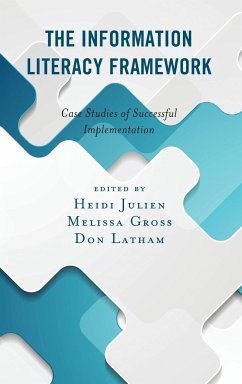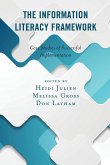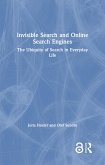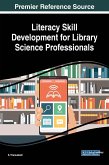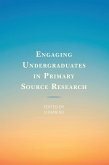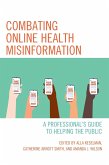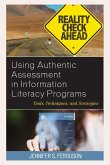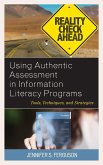Information Literacy Framework
Case Studies of Successful Implementation
Herausgeber: Julien, Heidi; Latham, Don; Gross, Melissa
Information Literacy Framework
Case Studies of Successful Implementation
Herausgeber: Julien, Heidi; Latham, Don; Gross, Melissa
- Gebundenes Buch
- Merkliste
- Auf die Merkliste
- Bewerten Bewerten
- Teilen
- Produkt teilen
- Produkterinnerung
- Produkterinnerung
This edited book helps demystify how to incorporate ACRL's Framework for Information Literacy for Higher Education into information literacy instruction in higher education as well as how to teach the new Framework to pre-service librarians as part of their professional preparation.
Andere Kunden interessierten sich auch für
![Information Literacy Framework Information Literacy Framework]() Information Literacy Framework57,99 €
Information Literacy Framework57,99 €![Invisible Search and Online Search Engines Invisible Search and Online Search Engines]() Jutta HaiderInvisible Search and Online Search Engines167,99 €
Jutta HaiderInvisible Search and Online Search Engines167,99 €![Literacy Skill Development for Library Science Professionals Literacy Skill Development for Library Science Professionals]() Literacy Skill Development for Library Science Professionals160,99 €
Literacy Skill Development for Library Science Professionals160,99 €![Engaging Undergraduates in Primary Source Research Engaging Undergraduates in Primary Source Research]() Engaging Undergraduates in Primary Source Research95,99 €
Engaging Undergraduates in Primary Source Research95,99 €![Combating Online Health Misinformation Combating Online Health Misinformation]() Combating Online Health Misinformation114,99 €
Combating Online Health Misinformation114,99 €![Using Authentic Assessment in Information Literacy Programs Using Authentic Assessment in Information Literacy Programs]() Jennifer S. FergusonUsing Authentic Assessment in Information Literacy Programs56,99 €
Jennifer S. FergusonUsing Authentic Assessment in Information Literacy Programs56,99 €![Using Authentic Assessment in Information Literacy Programs Using Authentic Assessment in Information Literacy Programs]() Jennifer S. FergusonUsing Authentic Assessment in Information Literacy Programs106,99 €
Jennifer S. FergusonUsing Authentic Assessment in Information Literacy Programs106,99 €-
-
-
This edited book helps demystify how to incorporate ACRL's Framework for Information Literacy for Higher Education into information literacy instruction in higher education as well as how to teach the new Framework to pre-service librarians as part of their professional preparation.
Produktdetails
- Produktdetails
- Verlag: Rowman & Littlefield Publishers
- Seitenzahl: 296
- Erscheinungstermin: 7. Februar 2020
- Englisch
- Abmessung: 235mm x 157mm x 22mm
- Gewicht: 634g
- ISBN-13: 9781538121436
- ISBN-10: 1538121433
- Artikelnr.: 57747921
- Herstellerkennzeichnung
- Libri GmbH
- Europaallee 1
- 36244 Bad Hersfeld
- gpsr@libri.de
- Verlag: Rowman & Littlefield Publishers
- Seitenzahl: 296
- Erscheinungstermin: 7. Februar 2020
- Englisch
- Abmessung: 235mm x 157mm x 22mm
- Gewicht: 634g
- ISBN-13: 9781538121436
- ISBN-10: 1538121433
- Artikelnr.: 57747921
- Herstellerkennzeichnung
- Libri GmbH
- Europaallee 1
- 36244 Bad Hersfeld
- gpsr@libri.de
Heidi Julien is a professor in the Department of Information Science at the University at Buffalo. She holds an MLIS degree from the University of Alberta and a Ph.D. in Library and Information Science from the University of Western Ontario. Her research focuses on digital and information literacy, and information behavior. She has received grants from the Institute of Museum and Library Services, and the Social Sciences and Humanities Research Council of Canada, and she has published and presented her work in a range of venues. She is a past-president of the Association for Library and Information Science Education, and a past-president of the Canadian Association for Information Science. Melissa Gross is a professor in the School of Information at Florida State University and a past president of the Association for Library and Information Science Education (ALISE). She received her Ph.D. from the University of California, Los Angeles in 1998 and was awarded the prestigious American Association of University Women Recognition Award for Emerging Scholars in 2001. She teaches and does research in the areas of Information seeking behavior, resources for youth, research methods, the evaluation of library programs and services, information literacy, and teacher and librarian collaboration. She has published extensively in a variety of peer-reviewed journals and is author, co-author, or co-editor of ten books. Don Latham is a professor in the School of Information at Florida State University. He holds an MLIS degree from Florida State University and a Ph.D. in English from the University of Georgia. His research focuses on information literacy, information literacy instruction, and information practices of young adults. He is the recipient of research grants from the Institute of Museum and Library Services, the Online Computer Library Center and the Association for Library and Information Science Education, and the FSU Council on Research and Creativity. He has published numerous journal articles on information literacy among college undergraduates.
Table of Contents
List of Figures
Foreword
Preface
Part I. Preparing to use the Framework
Chapter 1. Strategies for Mapping Information Literacy Threshold Concepts
to Course Objectives in Political Science
Mohamed Berray
Chapter 2. Faculty Workshops: Incorporating the Framework and Embedding
Information Literacy in Undergraduate Courses
Melissa Harden and Anna Michelle Martinez-Montavon
Chapter 3. Are They There Yet? Determining Student Mastery of Learning
Outcomes Based on the ACRL Framework
Holly Hendrigan, Keshav Makunda, and Diana Cukierman
Chapter 4. Finding Expertise in Your Own Backyard: Creating Communities of
Practice to Support Learning about the Framework
Kim Pittman, Amy Mars, and Trent Brager
Chapter 5. From Standards to Threshold Concepts, Knowledge Practices, and
Learner Dispositions: Rethinking Formal Information Literacy Instruction in
Higher Education
Leslie M. Ross
Chapter 6. An Idea That Sells Itself: The Framework as a Partnership Guide
and Faculty Marketing Tool
Sarah Steele, Steve Bahnaman, Brooke Taxakis, Ron Epps, and Elizabeth
Dobbins
Part II. Case studies of instruction using the Framework
Chapter 7. Teaching the Framework Using an Online Tutorial
Leanna Fry Balci and Peter J. Rich
Chapter 8. Designing a First-Year Foundation Program around the Framework
Brianna B. Buljung
Chapter 9. The Framework as Pedagogical Tool: Teaching Source Integration
Gina Calia-Lotz
Chapter 10. Redesigning a Credit Bearing Course using the ACRL Information
Literacy Framework
Kelly Diamond and Alyssa Wright
Chapter 11. The Framework and the Context: Refocusing Information Literacy
at a Caribbean University
Paulette A. Kerr and Jessica C. Lewis
Chapter 12. The Librarian's Journey Begins: Finding Pedagogical Authority
and Creativity in the ACRL Framework
Liza Oldham
Part III. Educating for the Framework
Chapter 13. Flexible Frameworks, New Paradigms: Examining Beliefs about the
ACRL Framework to Grow Teaching Practice
Andrea Baer
Chapter 14. Chandler-Gilbert Community College Case Study
Mary Beth Burgoyne and Kim Chuppa-Cornell
Chapter 15. Exploring Metaliterate Learning through the Frames of
Information Literacy
Thomas P. Mackey
Chapter 16. Extending the Framework for the Benefit of Praxis: A Strategic
Literacy-Based Approach to Diversity Education (SLADE)
Bharat Mehra and Keren Dali
Chapter 17. Teaching Future Librarian Educators Using the ACRL Framework: A
New Graduate-Level iSchool Teaching Certificate
Carla Stoffle, Nicole Pagowsky, and Yvonne Mery
Chapter 18. Rethinking the Reference and Instruction Curriculum Using the
Integrated Threshold Concept Knowledge Framework
Susan Rathbun-Grubb
About the Contributors
About the Editors
List of Figures
Foreword
Preface
Part I. Preparing to use the Framework
Chapter 1. Strategies for Mapping Information Literacy Threshold Concepts
to Course Objectives in Political Science
Mohamed Berray
Chapter 2. Faculty Workshops: Incorporating the Framework and Embedding
Information Literacy in Undergraduate Courses
Melissa Harden and Anna Michelle Martinez-Montavon
Chapter 3. Are They There Yet? Determining Student Mastery of Learning
Outcomes Based on the ACRL Framework
Holly Hendrigan, Keshav Makunda, and Diana Cukierman
Chapter 4. Finding Expertise in Your Own Backyard: Creating Communities of
Practice to Support Learning about the Framework
Kim Pittman, Amy Mars, and Trent Brager
Chapter 5. From Standards to Threshold Concepts, Knowledge Practices, and
Learner Dispositions: Rethinking Formal Information Literacy Instruction in
Higher Education
Leslie M. Ross
Chapter 6. An Idea That Sells Itself: The Framework as a Partnership Guide
and Faculty Marketing Tool
Sarah Steele, Steve Bahnaman, Brooke Taxakis, Ron Epps, and Elizabeth
Dobbins
Part II. Case studies of instruction using the Framework
Chapter 7. Teaching the Framework Using an Online Tutorial
Leanna Fry Balci and Peter J. Rich
Chapter 8. Designing a First-Year Foundation Program around the Framework
Brianna B. Buljung
Chapter 9. The Framework as Pedagogical Tool: Teaching Source Integration
Gina Calia-Lotz
Chapter 10. Redesigning a Credit Bearing Course using the ACRL Information
Literacy Framework
Kelly Diamond and Alyssa Wright
Chapter 11. The Framework and the Context: Refocusing Information Literacy
at a Caribbean University
Paulette A. Kerr and Jessica C. Lewis
Chapter 12. The Librarian's Journey Begins: Finding Pedagogical Authority
and Creativity in the ACRL Framework
Liza Oldham
Part III. Educating for the Framework
Chapter 13. Flexible Frameworks, New Paradigms: Examining Beliefs about the
ACRL Framework to Grow Teaching Practice
Andrea Baer
Chapter 14. Chandler-Gilbert Community College Case Study
Mary Beth Burgoyne and Kim Chuppa-Cornell
Chapter 15. Exploring Metaliterate Learning through the Frames of
Information Literacy
Thomas P. Mackey
Chapter 16. Extending the Framework for the Benefit of Praxis: A Strategic
Literacy-Based Approach to Diversity Education (SLADE)
Bharat Mehra and Keren Dali
Chapter 17. Teaching Future Librarian Educators Using the ACRL Framework: A
New Graduate-Level iSchool Teaching Certificate
Carla Stoffle, Nicole Pagowsky, and Yvonne Mery
Chapter 18. Rethinking the Reference and Instruction Curriculum Using the
Integrated Threshold Concept Knowledge Framework
Susan Rathbun-Grubb
About the Contributors
About the Editors
Table of Contents
List of Figures
Foreword
Preface
Part I. Preparing to use the Framework
Chapter 1. Strategies for Mapping Information Literacy Threshold Concepts
to Course Objectives in Political Science
Mohamed Berray
Chapter 2. Faculty Workshops: Incorporating the Framework and Embedding
Information Literacy in Undergraduate Courses
Melissa Harden and Anna Michelle Martinez-Montavon
Chapter 3. Are They There Yet? Determining Student Mastery of Learning
Outcomes Based on the ACRL Framework
Holly Hendrigan, Keshav Makunda, and Diana Cukierman
Chapter 4. Finding Expertise in Your Own Backyard: Creating Communities of
Practice to Support Learning about the Framework
Kim Pittman, Amy Mars, and Trent Brager
Chapter 5. From Standards to Threshold Concepts, Knowledge Practices, and
Learner Dispositions: Rethinking Formal Information Literacy Instruction in
Higher Education
Leslie M. Ross
Chapter 6. An Idea That Sells Itself: The Framework as a Partnership Guide
and Faculty Marketing Tool
Sarah Steele, Steve Bahnaman, Brooke Taxakis, Ron Epps, and Elizabeth
Dobbins
Part II. Case studies of instruction using the Framework
Chapter 7. Teaching the Framework Using an Online Tutorial
Leanna Fry Balci and Peter J. Rich
Chapter 8. Designing a First-Year Foundation Program around the Framework
Brianna B. Buljung
Chapter 9. The Framework as Pedagogical Tool: Teaching Source Integration
Gina Calia-Lotz
Chapter 10. Redesigning a Credit Bearing Course using the ACRL Information
Literacy Framework
Kelly Diamond and Alyssa Wright
Chapter 11. The Framework and the Context: Refocusing Information Literacy
at a Caribbean University
Paulette A. Kerr and Jessica C. Lewis
Chapter 12. The Librarian's Journey Begins: Finding Pedagogical Authority
and Creativity in the ACRL Framework
Liza Oldham
Part III. Educating for the Framework
Chapter 13. Flexible Frameworks, New Paradigms: Examining Beliefs about the
ACRL Framework to Grow Teaching Practice
Andrea Baer
Chapter 14. Chandler-Gilbert Community College Case Study
Mary Beth Burgoyne and Kim Chuppa-Cornell
Chapter 15. Exploring Metaliterate Learning through the Frames of
Information Literacy
Thomas P. Mackey
Chapter 16. Extending the Framework for the Benefit of Praxis: A Strategic
Literacy-Based Approach to Diversity Education (SLADE)
Bharat Mehra and Keren Dali
Chapter 17. Teaching Future Librarian Educators Using the ACRL Framework: A
New Graduate-Level iSchool Teaching Certificate
Carla Stoffle, Nicole Pagowsky, and Yvonne Mery
Chapter 18. Rethinking the Reference and Instruction Curriculum Using the
Integrated Threshold Concept Knowledge Framework
Susan Rathbun-Grubb
About the Contributors
About the Editors
List of Figures
Foreword
Preface
Part I. Preparing to use the Framework
Chapter 1. Strategies for Mapping Information Literacy Threshold Concepts
to Course Objectives in Political Science
Mohamed Berray
Chapter 2. Faculty Workshops: Incorporating the Framework and Embedding
Information Literacy in Undergraduate Courses
Melissa Harden and Anna Michelle Martinez-Montavon
Chapter 3. Are They There Yet? Determining Student Mastery of Learning
Outcomes Based on the ACRL Framework
Holly Hendrigan, Keshav Makunda, and Diana Cukierman
Chapter 4. Finding Expertise in Your Own Backyard: Creating Communities of
Practice to Support Learning about the Framework
Kim Pittman, Amy Mars, and Trent Brager
Chapter 5. From Standards to Threshold Concepts, Knowledge Practices, and
Learner Dispositions: Rethinking Formal Information Literacy Instruction in
Higher Education
Leslie M. Ross
Chapter 6. An Idea That Sells Itself: The Framework as a Partnership Guide
and Faculty Marketing Tool
Sarah Steele, Steve Bahnaman, Brooke Taxakis, Ron Epps, and Elizabeth
Dobbins
Part II. Case studies of instruction using the Framework
Chapter 7. Teaching the Framework Using an Online Tutorial
Leanna Fry Balci and Peter J. Rich
Chapter 8. Designing a First-Year Foundation Program around the Framework
Brianna B. Buljung
Chapter 9. The Framework as Pedagogical Tool: Teaching Source Integration
Gina Calia-Lotz
Chapter 10. Redesigning a Credit Bearing Course using the ACRL Information
Literacy Framework
Kelly Diamond and Alyssa Wright
Chapter 11. The Framework and the Context: Refocusing Information Literacy
at a Caribbean University
Paulette A. Kerr and Jessica C. Lewis
Chapter 12. The Librarian's Journey Begins: Finding Pedagogical Authority
and Creativity in the ACRL Framework
Liza Oldham
Part III. Educating for the Framework
Chapter 13. Flexible Frameworks, New Paradigms: Examining Beliefs about the
ACRL Framework to Grow Teaching Practice
Andrea Baer
Chapter 14. Chandler-Gilbert Community College Case Study
Mary Beth Burgoyne and Kim Chuppa-Cornell
Chapter 15. Exploring Metaliterate Learning through the Frames of
Information Literacy
Thomas P. Mackey
Chapter 16. Extending the Framework for the Benefit of Praxis: A Strategic
Literacy-Based Approach to Diversity Education (SLADE)
Bharat Mehra and Keren Dali
Chapter 17. Teaching Future Librarian Educators Using the ACRL Framework: A
New Graduate-Level iSchool Teaching Certificate
Carla Stoffle, Nicole Pagowsky, and Yvonne Mery
Chapter 18. Rethinking the Reference and Instruction Curriculum Using the
Integrated Threshold Concept Knowledge Framework
Susan Rathbun-Grubb
About the Contributors
About the Editors

